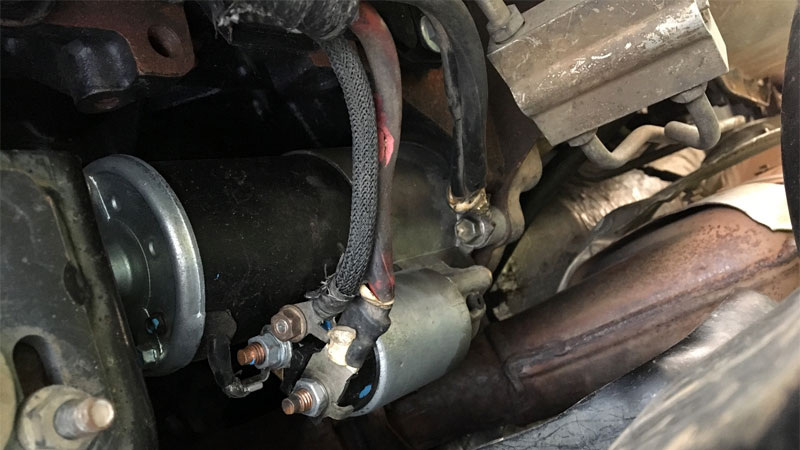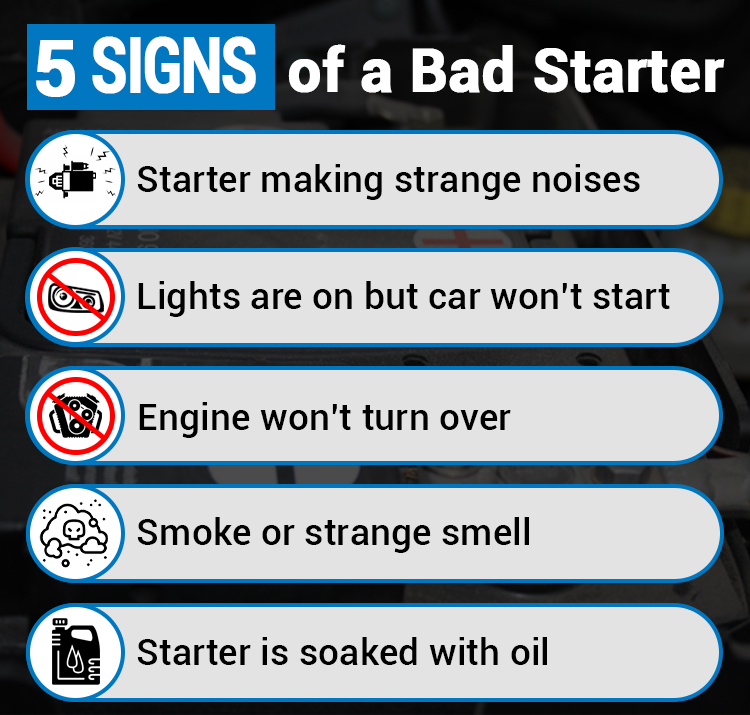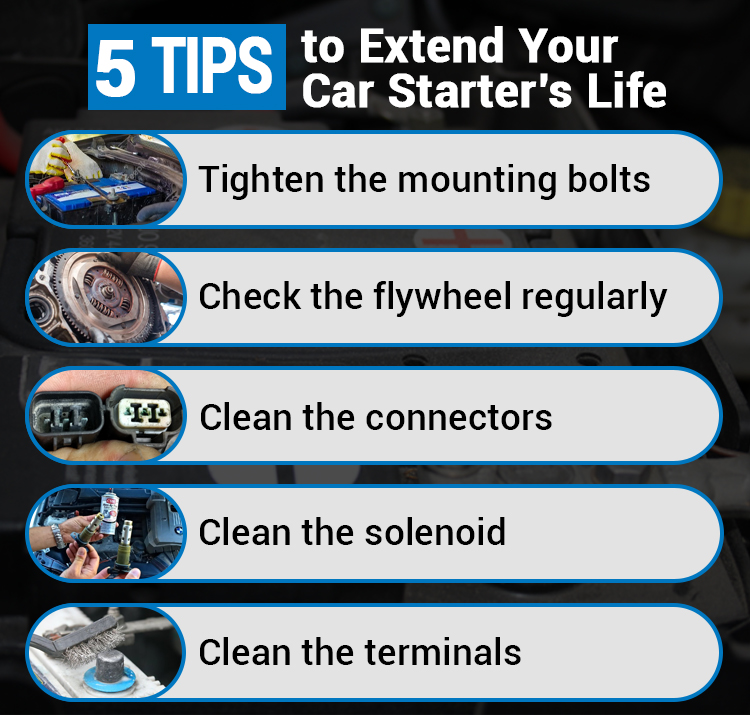Today, countless things can improve your car’s performance. But at the same time, many factors can have a negative impact, too. For example, the interaction between a car’s starter and its battery is quite significant.
So how exactly does a starter work? And is it possible for a bad starter to drain your battery?
Read Also – What Happens If You Jump a Car Wrong?
How a Car Starter Works
Starters are electric motors, and, as their name suggests, their primary purpose is to help your vehicle start properly. Whenever you turn your key in the ignition, you can hear the engine turnover and crank, right? But, as simple as it sounds, this small crank requires an immense amount of effort and energy, and that’s where the starter comes into play.
A starter is a device that rotates the car’s internal combustion engine and initiates operations. You can find hydraulic, pneumatic, and electric starters in the market.
In simple words, the process of starting the engine involves air flowing inside it as a result of the suction force created by your engine turning over. As air flows through the machine, fuel starts to combust, and your engine comes to life.
Every engine has a flywheel or a flex plate attached to the crankshaft’s end. Each of these flywheels has a ring gear with grooves in it. And every starter has parts specifically designed for these grooves. When you turn the switch (ignition), it energizes the starter motor.
The gear and the flywheel meet, and the starter does its magic. The engine starts spinning over and sucks air and fuel. Simultaneously, electricity flows through the wires towards the plugs, aiding fuel combustion in the chamber.
See Also – Causes of a Car That Won’t Start In Cold Weather
Can a Bad Starter Drain Your Battery?
So, can a bad starter drain your battery? The short answer is: Yes, it can. It could also drain the battery even faster if you repeatedly try to start your car with a faulty starter.
A faulty starter is also one of the leading causes of battery overcharging. These problems can spiral out of control quite quickly if you don’t pay attention to your vehicle regularly. That’s why it would be best to learn the symptoms of a bad starter, as well as how to prevent them.
How To Know If You Have a Bad Starter
Since repeatedly trying to run your car on a bad starter can make things worse, you must identify a faulty starter at the very first sign. So, here are some of the most significant symptoms of a faulty starter so you can recognize the problem immediately.
1. Your Starter Makes Strange Noises
Pay special attention to the noises and sounds you hear when you try to start your engine. If you hear strange or unusual whirring and grinding noises every time you turn the key, it means there’s something wrong with your starter or that it has gone bad.
Another common situation is that you hear whirring sounds when you start the vehicle, but your engine doesn’t crank over. In such a scenario, it is again highly likely that your starter has an issue.
2. Lights Are On, But Car Won’t Start
If turning the key causes your headlights to light up but your engine isn’t working, your starter is most likely the problem. In such scenarios, your dashboard looks fully operational, so everything is great with your vehicle.
However, if your engine does not cooperate when starting the car, your starter doesn’t do its job. Try starting the car a couple more times before you finally give up. Once you are sure there is something wrong, call your mechanic or specialist immediately.
3. Engine Won’t Turn Over
The most apparent symptom of a bad starter is that the engine refuses to turn over no matter how hard you try. Ironically, this issue can have many underlying problems other than a faulty starter. If you don’t have proper mechanical knowledge of automobiles, it will be challenging to diagnose yourself.
So, get your car checked by a professional as soon as you can. They will figure out what the main problem is and why your engine won’t turn over. If the issue is with the starter, they will guide you appropriately.
See Also – 5 Reasons Your Key Is Stuck in the Ignition
4. Smoke or Strange Smell
If you smell something unusual or see smoke coming out of your engine every time you try to start it, stop immediately. Regardless of whether you have a bad starter, such a symptom can indicate danger.
So, one should get out of the car without losing any precious time. However, this symptom can also have many culprits behind it, and identifying the leading cause can be tricky and dangerous if you are not an expert. Hence, consult a mechanic or a specialist as soon as possible.
5. Starter Is Soaked With Oil
If you’re lucky enough, you will probably see something unusual with your starter while taking a quick maintenance check around your car. Why is this lucky? Because most people don’t encounter the problem directly. They have to wait for severe symptoms to show up before they finally realize something is wrong.
So, if any day you find your starter soaked in oil, know that it is probably an oil leak. Oil leaks are anything but normal and indicate that your starter has a problem. Tiny drops of leaking oil can eventually become a pervasive problem, so before it gets out of hand, make sure you get it checked.
Extending Your Car Starter’s Life
If you have a bad starter that is irreparable, the only solution to the problem is replacing it. However, there are specific ways to prevent such a worsened situation and prolong the life of your starter:
Tip No. 1: Tighten The Mounting Bolts
Mounting bolts hold the starter motor in place so that it does not move or get damaged. If these bolts become loose, which is possible, the starter drive will not engage with the flywheel, and this will negatively impact their bond.
Since you know how vital these two mechanical parts are to work together in synchrony, you would understand that your engine would not start if anything went wrong here.
So, if you hear a grinding sound when you try starting the engine, a very probable cause is loosened mounting bolts. To avoid the situation, check the bolts periodically and make sure they are tight. And if you sense something unusual, check the bolts immediately and ensure that everything is alright.
Tip No. 2: Inspect The Flywheel
As discussed earlier, the flywheel is an integral part of the whole engine cranking process. So, if you sense anything unusual when starting your engine, the flywheel should be one of the first places you should check for an issue.
The starter has a pinion gear on its front side, and this gear engages with the flywheel and results in the engine cranking. When the teeth of the gear and the flywheel merge and move in synchronicity, smooth operations. Hence, both sets of teeth should be in excellent condition.
If a part of the flywheel is missing, worn out, or cracked, the first symptom would be a malfunctioning starting motor. The solution is to replace the flywheel immediately. However, please leave it to the experts and don’t try to do it yourself.
Tip No. 3: Clean The Connectors
Connecting wires play an essential role in securing your starter motor and your battery. Since they are the primary “bridge” between the two devices, any problem with this connection can cause issues. Grime, dirt, corrosion, all these nasty things can reduce the current strength and weaken the starter.
So, keep a regular eye on these connectors, and make them a top suspect if you sense anything wrong with the starter motor. If you spot an accumulation of dirt or anything else, make sure you clean it immediately.
Tip No. 4: Clean The Solenoid
Your starter motor house has a relay, and it’s called the solenoid. It is right on top of your motor and looks like a tiny cylindrical object. Usually, the positive cable of your battery attaches to this solenoid, making it the positive terminal of your battery.
Similar to the terminal, this solenoid also requires maintenance and regular cleaning. Debris, dirt, and corrosion accumulating on and around the solenoid can reduce its performance. Therefore, it is always best to make a routine check on your engine, battery, and starter and clean these parts regularly.
Tip No. 5: Clean The Terminals
Lastly, pay special attention to the terminals since these are the most notorious, problem-causing parts of the battery. They get targeted by corrosion and eventually get completely covered with this nastiness.
Since battery acids regularly produce hydrogen, it eventually finds a way out of the car battery and causes all sorts of issues. Such gases are common for creating corrosive materials and accumulating around the terminals.
After a few years, once the terminals are entirely covered with it, the paths for electric current become affected and the current reaching the starter motor becomes weak. The best and only way of avoiding such a scenario is that the terminals are always clean and in good shape.
- What the Letters and Numbers On an Automatic Gear Shift Mean - Sep 12, 2022
- How Long Does it Take to Change Tires? (Professional vs DIY) - Jun 8, 2022
- 2022 Ford Bronco EcoBoost Performance & Off-Roading Specs - Jun 2, 2022




Does the starter wires have any things to do with the charging system
No, but it has everything to do with discharging. In fact, the starter needs a massive draw from the battery when you start the car topping all other components like headlight, GPS, and Stereo. The alternator is the one that charges the battery when you drive the car.
Hi I have a question, my alternator is new but my battery still doesn’t last, is it because of the starter?
Starter is highly unlikely. Battery is most likely. How old is it? Are the connections from the alternator to battery solid? You should get the battery tested but if someone else installed the alternator, they should have done that. A parasitic drain somewhere is also a possibility.